MercoPress. South Atlantic News Agency
Tag: Brexit
-
Monday, February 20th 2017 - 10:42 UTC
Tony Blair proposes a cross-party movement to rethink Brexit: “ideologues are driving the bus”
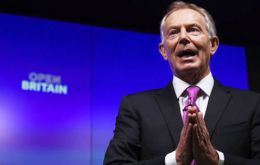
Tony Blair has called on pro-Europeans to form a new cross-party movement to persuade the public they were wrong to vote to leave the EU. In an impassioned speech, the former prime minister said “progressives” should make it their “mission” to reverse the outcome of the referendum last June.
-
Thursday, February 16th 2017 - 10:59 UTC
Brexit Minister admits some parliamentary “ping pong”, but March timetable stands
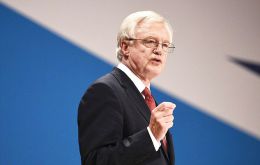
British ministers are braced for a parliamentary battle and are prepared for the Article 50 legislation to be rewritten by the House of Lords, David Davis has indicated. The Brexit Secretary said he expected some parliamentary “ping pong”, with the Bill being sent back and forth between the Commons and the Lords, suggesting he expected peers to defeat the Government and make changes to the tightly-worded legislation.
-
Sunday, February 12th 2017 - 13:50 UTC
Spain and EC address Brexit consequences for the fish industry

Spain's Secretary General of Fisheries from the Ministry of Agriculture and Fisheries, Food and Environment Alberto Lopez Asenjo has met with representatives of the European Commission (EC) to address the consequences of Brexit for the Spanish fishing fleet and its markets.
-
Saturday, February 11th 2017 - 13:29 UTC
German top banker warns London could lose role as gateway to Europe's financial hub
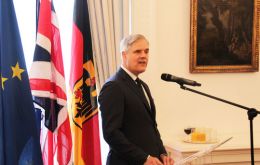
One of Germany's most senior banking regulators has warned London that it is likely to lose its role as “the gateway to Europe” for vital financial services. Dr Andreas Dombret, executive board member for the German central bank, the Bundesbank, said that even if banking rules were “equivalent” between the UK and the rest of the European Union that was “miles away from access to the single market”.
-
Saturday, February 11th 2017 - 07:14 UTC
UK's “exit bill” £ 48 billion? “It would be like leaving a bar without paying for your drinks”
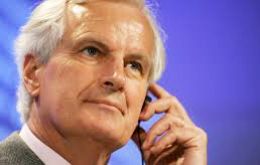
The European Commission has refused to discuss the size of the “exit bill” to be handed to the UK when it withdraws from the EU, amid reports the demand has been fixed at around £48 billion.
-
Wednesday, February 8th 2017 - 10:49 UTC
Scottish Parliament opposes UK government starting the Brexit process

The Scottish Parliament has voted by 90 to 34 to oppose the UK government starting the Brexit process. The Supreme Court ruled last month that there was no legal need for Holyrood to give its consent to the triggering of Article 50, but First Minister Nicola Sturgeon said she would let MSPs have a say, despite it being largely symbolic.
-
Wednesday, February 8th 2017 - 10:28 UTC
British government manages to avoid conditions to the Brexit bill
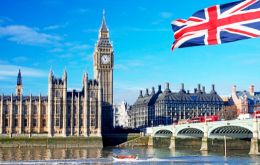
The British government has seen off an attempt to add conditions to its Brexit bill as a Conservative rebellion was avoided. MPs rejected a bid by Labour's Chris Leslie to force the government to consult Parliament on the deal struck with the EU before it is finalized. It came after ministers pledged that a “meaningful” vote would be offered.
-
Wednesday, February 8th 2017 - 10:01 UTC
Falklands attends UKOTs Brexit implications forum in London
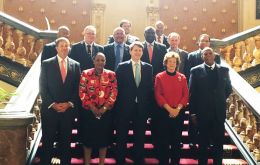
British Overseas Territories representatives, including from the Falkland Islands held a two-day meeting in London to address Brexit implications such as development funds, tariff free fish exports and the right to travel freely through the European Union. The meeting was in the framework of Prime Minister Theresa May's administration initiative to involve all parts of the UK in preparing for the crucial negotiations.
-
Monday, February 6th 2017 - 09:50 UTC
Post-Brexit UK citizens rights: Rajoy supports reciprocal arrangements for Britons
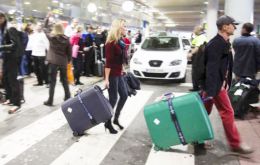
Theresa May’s hopes for an early deal on the post-Brexit rights of British citizens living in the EU were given a boost as Spain’s Mariano Rajoy backed the plan. The Prime Minister has refused to guarantee the status of EU citizens in the UK unless reciprocal arrangements are made for Britons living on the continent.
-
Saturday, February 4th 2017 - 06:15 UTC
UK assures Gibraltar about access to financial services market and sovereignty
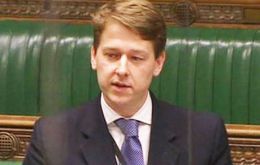
Britain will maintain Gibraltar’s existing access to the UK financial services market and broaden it where possible, a British Government minister told the House of Lords on Thursday, as he insisted sovereignty was “simply not on the table” in the Brexit process.
